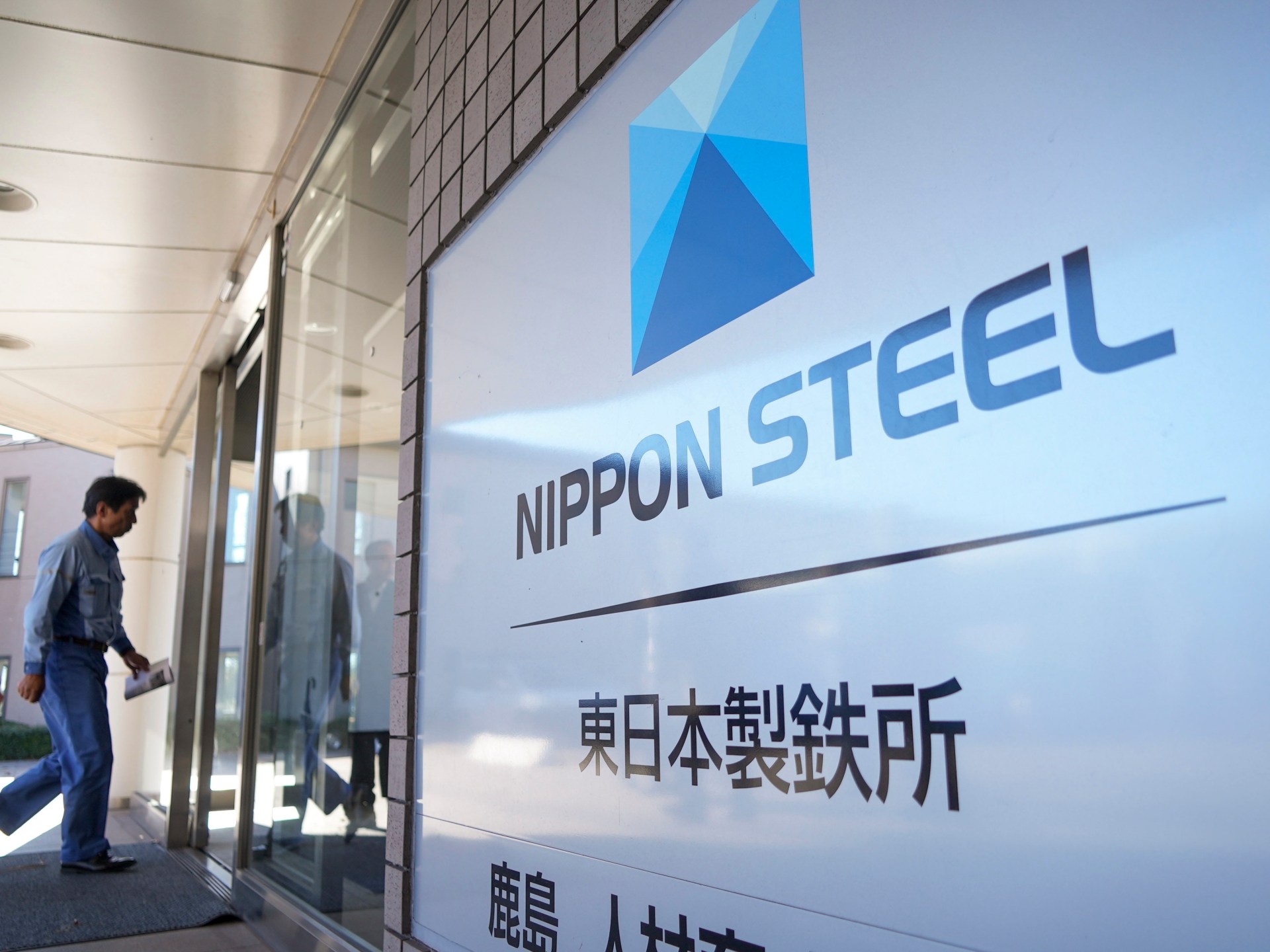US Steel, Nippon sue Biden administration over decision to block merger | Business and Economy News

Nippon Steel and US Steel have filed a federal lawsuit in the United States challenging the Biden administration’s decision to block Nippon’s proposed $15 billion acquisition of the Pittsburgh company. The companies say the president of the United Steelworkers union and a rival steelmaker worked together to thwart the takeover.
The lawsuit filed on Monday alleges that US President Joe Biden violated a decision by the Committee on Foreign Investment in the United States (CFIUS), which screens foreign investments for national security risks, and violated the companies’ right to fair review.
In his move to block the deal on Friday, Biden said US companies that produce a large amount of steel needed to “continue to lead the fight on behalf of US national interests,” even though Japan, where Nippon is based, is a staunch ally. This is the first time that an American president has blocked a merger between an American and Japanese company.
In separate lawsuits filed in the US Court of Appeals for the District of Columbia and the US District Court for the Western District of Pennsylvania, the steelmakers claim that was a political decision made by the Biden administration and had no rational legal basis.
“Nippon Steel and US Steel have engaged in good faith with all parties to emphasize how the transaction enhances, not threatens, the national security of the United States,” the companies said in a prepared statement on Monday.
Nippon Steel had promised to invest $2.7 billion in US Steel’s old blast furnace operations in Gary, Indiana, and Moon Valley, Pennsylvania, and said it was better positioned to help the United States compete in an industry dominated by the Chinese.
US Steel has warned that, without Nippon Steel’s money, it will shift production away from blast furnaces to cheaper non-union electric arc furnaces and move its headquarters outside Pittsburgh.
In a separate lawsuit filed in the U.S. District Court for the Western District of Pennsylvania, the companies accused steelmaker rival Cleveland-Cliffs Inc. and its CEO, Lourenco Goncalves, of coordinating with David McCall, president of the United Steelworkers (USW) union. On charges of “engaging in a coordinated series of anti-competitive and racketeering activities” to prevent the deal. McCall on Monday called the allegations baseless.
In 2023, before US Steel accepted a takeover offer from Nippon, Cleveland-Cliffs offered to buy US Steel for $7 billion. US Steel rejected the offer and later accepted an all-cash offer from Nippon Steel which has now been rejected.
Political merger
The merger has become highly politicized ahead of the US presidential election in November, with both Democrat Biden and Republican President-elect Donald Trump vowing to kill it as they seek to woo voters in the swing state of Pennsylvania, where US Steel is headquartered. USW President McCall opposed this connection.
Both Trump and Biden stressed that the company should remain US-owned even after the Japanese company offered to move its US headquarters to Pittsburgh, where the US steelmaker is based, and promised to respect all agreements concluded between US Steel and USW.
The companies allege that Biden sought to cancel the deal in order to “curry favor with USW leadership in Pennsylvania in his re-election bid.”
“As a result of President Biden’s undue influence to advance his political agenda, CFIUS failed to conduct a good faith regulatory review process focused on national security,” the companies said in a statement announcing the lawsuit.
A White House spokesperson said: “A panel of national security and trade experts determined that this acquisition would create a risk to America’s national security. President Biden will never hesitate to protect this nation’s security, infrastructure, and the resiliency of its supply chains.”
The outlook is unclear for the lawsuit, which also targets Attorney General Merrick Garland and Treasury Secretary Janet Yellen, who oversees the Committee on Foreign Investment in the United States. Experts say courts generally give too much weight to CFIUS in defining national security.
The US Department of Justice declined to comment, and the Treasury Department did not respond to a request for comment from Reuters.
Trump asked, in a post on his social media platform, “Why do they want to sell US Steel now when tariffs will make it a more profitable and valuable company?”
Trump promised to impose tariffs on imports in all areas.
US Steel, founded in 1901 by some of the United States’ biggest magnates, including Andrew Carnegie, J.P. Morgan, and Charles Schwab, became intertwined with the country’s industrial recovery in the wake of the Great Depression and World War II.
The company has been under pressure after several quarters of declining revenues and profits, making it an attractive takeover target for competitors looking to expand their share of the US market.
“Manipulated” review.
Nippon Steel’s December 2023 bid for US Steel faced headwinds from the start.
The companies said Biden opposed the deal on March 14, before the Committee on Foreign Investment in the United States review began, prejudging the outcome and denying the companies due process, guaranteed by the Constitution and CFIUS regulations.
McCaul endorsed Biden a week later. Biden was later replaced on the ticket by Vice President Kamala Harris, who also opposed the deal and it was approved by the USW.
After review, CFIUS typically approves the deal, or recommends that the president block it. In rare cases, when the agencies that make up CFIUS cannot reach an agreement, they can refer the matter to the president, as they did with the Nippon Steel deal on December 23, paving the way for the Biden bloc.
Prior to that, CFIUS staff were prohibited from negotiating with companies on a proposed agreement to address the committee’s national security concerns, the statement alleges, a marked deviation from normal practice.
“The review process was clearly manipulated so that its findings supported President Biden’s predetermined decision,” the companies said. “This cannot be the due process that parties before CFIUS are entitled to follow.”
https://www.aljazeera.com/wp-content/uploads/2025/01/AP25006470670967-1736188365.jpg?resize=1920%2C1440
2025-01-06 19:13:00




